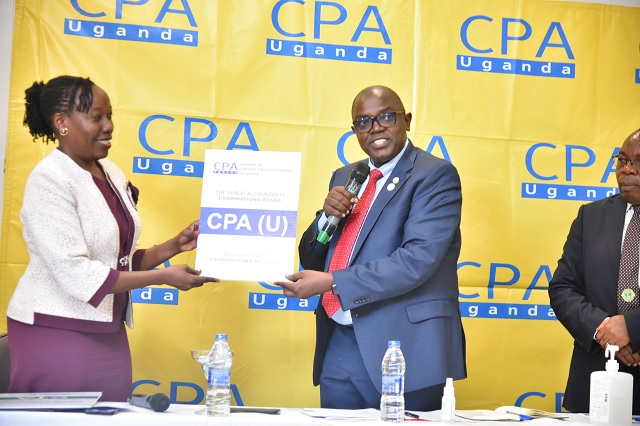
Kampala, Uganda | THE INDEPENDENT | The Institute of Certified Public Accountants (ICPAU) has launched revised syllabuses for the Certified Public Accountants of Uganda (CPA) and Accounting Technicians Diploma (ATD) courses. The National Council for Higher Education has approved the syllabuses as required by the Accountants Act, 2013, and will become effective January 2023.
The Institute has in consultation with the National Council for Higher Education, also completed the development of the Uganda Accountancy Qualification Framework as a subset of the Uganda Higher Qualifications Framework and now awaits approval.
This framework, if approved by the NCHE, will mainstream the competencies required of aspiring accountants at higher institutions of learning and professional level. This is aimed at easing the process and the possibility of equating accountancy qualifications between accountancy professional bodies like UCPAU and mainstream high institutes of education especially universities.
It is also aimed at guiding employers when recruiting and placing accounting staff.
Many accountancy students and graduates have found it hard to explain to prospective employers when seeking to further their studies, because of a lack of a framework to guide the process.
Constant Othieno Mayende, the President of ICPAU says this will also help university graduates seeking to take professional accountancy courses, to know which subject exemptions they are entitled to.
Currently, ICPAU has memoranda of understanding with five universities including Makerere University, Uganda Martyrs, and Islamic University in Uganda, which enables them to equate each other’s qualifications. In revising the syllabus, new standards guiding the curriculum have taken into account the International Education Standards as required by the International Federation of Accountants (IFAC).
Professional accountancy syllabuses are periodically revised to match the rapidly changing environment, and the revision was supposed to take place two years ago but was disrupted by the COVID-19 outbreak. John Bosco Ntangaare, the Director for Education at ICPAU, says the process has taken care to align the content to the demands of both local and global business environments.
For this, new subjects like the law of cooperatives as well as insolvency, have been added to the court and others expanded to cater to the changing needs in the market, according to Ntangaare.
The CPA syllabus has continued to have 4 levels with 18 subjects. The content and learning outcomes have been refreshed. Ntangare says the CPA course is designed to produce competent professional accountants, capable of making a positive contribution to the profession and the national economy in general.
“The graduates of the course have the potential to serve in many capacities which include financial and management accountants, finance managers, auditors, tax and financial consultants, chief executive officers, chief operating officers, etc.,” he says.
Mayende, the ICPAU President also adds that even the technology has changed the mode of service delivery and the courses also have to adjust to the new developments
ATD course has three levels and 12 subjects. The course has been aligned to the CPA such that those who complete will be exempted from the entire Level 1 and start CPA at Level 2.
ATD course is designed to produce competent accounting staff with a wide range of technical knowledge, skills, and attitudes to enable them to work in any sector of the economy. The new syllabuses will start with the May 2023 examinations, meaning that the exam results released on Thursday were the last under the outgoing syllabus, according to CPA Mayende.
The results newly released were for the December diet, which has seen a decline in performance compared to the June diet. A total of 150 candidates sat for the Accounting Technicians Diploma (ATD) exam, which registered a 46.2 percent pass rate, down from 53.2 percent registered for June.
According to the results, 5,052 students sat the CPA exams in December and 35.8 percent passed, registering a decline from the 38.5 percent from the June Diet.
Prof. Laura Orobia from the Public Accountants Examinations Board attributed the low pass rates to the inability of students to integrate reporting standards as required and the inability to tailor their answers to questions that relate to real-life situations, adding that the “generic answers” demonstrates that they lack application skills.
Other shortcomings cited include that the students were not up-to-date especially in the areas of professional standards, taxation, and laws, while others concentrated on the recent topics covered and forgot the earlier ones.
“Candidates still misinterpret examiners’ requirements, provide shallow answers that are not contextualized to the scenario provided, and tend to spot and cram which limits their chances of passing,” she said.
The students are also blamed for concentrating on theoretical aspects of the syllabus, yet most papers comprise both computational and theoretical parts, while others take too much time on the compulsory questions and answer the other questions in hurry.
*****
URN
 The Independent Uganda: You get the Truth we Pay the Price
The Independent Uganda: You get the Truth we Pay the Price



